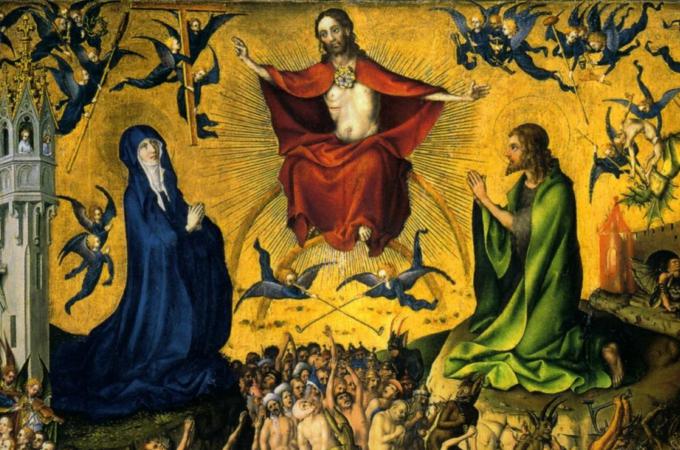When the end comes
Many saints and Church leaders have seen a connection between Christ's words in the Gospel for the Solemnity of Christ the King (see Matthew 25:31-43) and His promise to be present in the Eucharist (see Matthew 26:26-29; Mark 14:22-25; Luke 22:15-20).
For instance, Blessed Mother Teresa of Calcutta used to say of her work with the destitute: "In Holy Communion we have Christ under the appearance of bread. In our work we find Him under the appearance of flesh and blood. It is the same Christ. 'I was hungry, I was naked, I was sick, I was homeless.'"
St. John Chrysostom, the great patriarch of Eastern Catholicism, said the same thing in the fourth century: "Do you wish to honor the body of Christ? Do not ignore Him when He is naked. Do not pay Him homage in the temple clad in silk only then to neglect Him outside where He suffers cold and nakedness. He who said: 'This is my body' is the same One who said: 'You saw me hungry and you gave me no food', and 'Whatever you did to the least of my brothers you did also to me' . . . What good is it if the Eucharistic table is overloaded with golden chalices, when He is dying of hunger? Start by satisfying His hunger, and then with what is left you may adorn the altar as well."
The Church year ends today with a vision of the end of time. The scene in the Gospel is stark and resounds with Old Testament echoes.
The Son of Man is enthroned over all nations and peoples of every language (see Daniel 7:13-14). The nations have been gathered to see His glory and receive His judgment (see Isaiah 66:18; Zephaniah 3:8). The King is the divine shepherd Ezekiel foresees in today's First Reading, judging as a shepherd separates sheep from goats.
Each of us will be judged upon our performance of the simple works of mercy we hear in the Gospel today.
These works, as Jesus explains today, are reflections or measures of our love for Him, our faithfulness to His commandment that we love God with all our might and our neighbor as ourselves (see Matthew 22:36-40).
Our faith is dead, lifeless, unless it be expressed in works of love (see James 2:20; Galatians 5:6). And we cannot say we truly love God, whom we cannot see, if we don't love our neighbor, whom we can (see 1 John 4:20).
The Lord is our shepherd, as we sing in today's Psalm. And we are to follow His lead, to imitate His example (see 1 Corinthians 1:11; Ephesians 5:1).
He healed our sickness (see Luke 6:19), freed us from the prison of sin and death (see Romans 8:2,21), welcomed us who were once strangers to His covenant (see Ephesians 2:12,19). He clothed us in baptism (see Revelation 3:5; 2 Corinthians 5:3-4), and feeds us with the food and drink of His own body and blood.
At "the end," He will come again to hand over His kingdom to His Father, as Paul says in today's Epistle.
Let us strive to be following Him in right paths, that this kingdom might be our inheritance, that we might enter into the eternal rest promised for the people of God (see Hebrews 4:1,9-11).
Solemnity of Christ the King
Ezekiel 34:11-12, 15-17
Psalm 23:1-3, 5-6
1 Corinthians 15:20-26, 28
Matthew 25:31-46
- Scott Hahn is the founder and president of the Saint Paul Center for Biblical Theology. He is also the bestselling author of numerous books including The Lamb's Supper, Reasons to Believe, and Rome Sweet Home (co-authored with his wife, Kimberly). Some of his newest books are The Creed, Joy to the World and Evangelizing Catholics.



















